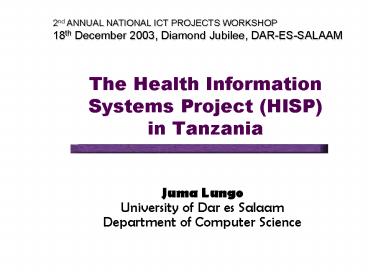The Health Information Systems Project HISP in Tanzania - PowerPoint PPT Presentation
1 / 17
Title:
The Health Information Systems Project HISP in Tanzania
Description:
The Health Information Systems Project (HISP) in Tanzania. Juma Lungo ... 2nd ANNUAL NATIONAL ICT PROJECTS WORKSHOP. 18th December 2003, Diamond Jubilee, DAR-ES-SALAAM ... – PowerPoint PPT presentation
Number of Views:192
Avg rating:3.0/5.0
Title: The Health Information Systems Project HISP in Tanzania
1
The Health Information Systems Project (HISP) in
Tanzania
2nd ANNUAL NATIONAL ICT PROJECTS WORKSHOP 18th
December 2003, Diamond Jubilee, DAR-ES-SALAAM
- Juma Lungo
- University of Dar es Salaam
- Department of Computer Science
2
Background
- It is a network project in many developing
countries South Africa, Mozambique, Malawi and
now in Tanzania. - - enabling sharing and transferring of
expertise among different countries - It includes a District Health Information
Software as a tool for enhancing the use of data
and information within the health sector.
1
3
Project Objective
- To design and implement District Health
Information Software (DHIS) - To support the development of an Excellent and
Sustainable District Health Information Systems - To collaborate with University institutions in
delivering Health and Management Information
Systems (HMIS) Courses for health workers - Rationale
- The DHIS is a health data analysis tool for all
the data captured through the Health Management
Information System of Tanzania (MTUHA) and other
programs like TB/Leprosy, IDWE, and population
data (DSS) which are currently collected and
analysed manually at the district level.
2
4
Project Management
- Address Secretary, HISP Tanzania, Department of
Computer Science, University of Dar es Salaam, P.
O. Box 35062, Dar es Salaam. Tel.255 748 31 32
00
BOARD MEMBERS
COORDINATOR
SECRETARY
Project Members
2
5
HISP Tanzania Members
- HISP is composed of a group of Computer and
Public Health Professionals from the University
of Dar es Salaam, University of Oslo, Institute
of Finance Management, and Ministry of Health - Participating Researchers Come from
- MUCHS 2 members
- CS/UDSM 4 members
- IFM 1 member
- UIO 1 member
- MTUHA/MoH 2 members
- The project is running under the Department of
Computer Science, University of Dar es Salaam
1
6
Project Cost
- It cost 8,800.00 to run the project in one
district per year - The project is running in 5 districts and thus
the total cost per year is 44,000.00 - The project is estimated to run for 10 years
- NUFU through the University of Oslo is funding
project administrative and running costs - NORAD is funding a course HMIS to be conducted
by the Department of Computer Science, University
of Dar es Salaam in collaboration with Malawi
Medical College
7
The HISP Tanzania database
- The DHIS is inline with the implementation of
District Reform Sector Programmes throughout
Tanzania empower the local levels with reliable
and timely information - Designed to work at four levels Facility,
district, regional, and national - Data can be imported/exported from either levels
- Is free open source multilanguage software
Swahili and English - One can work on the same data in Swahili or
English
4
8
The HISP Tanzania database
- Modularised software
- Health data elements are stored as database
records, thus can be changed without redesigning
the software - Various modules for TB, DSS, and Facility
Infrastructures all working together - Presents reports as standard reports and user
defined reports - Has the capability of exporting the raw data into
Excel Spreedsheets (pivot tables) - Developed to run Microsoft Platforms
5
9
Project Output and Progress
- The DHIS is a computer database that capture data
from the district-processing file (DPF) at the
district medical offices - Since its inception in January 2002, DPF reports
2001 2002 of health data from Kibaha and
Bagamoyo districts were computerised in DHIS - Presentations were made at the HMIS section of
the Ministry of Health - Conference papers were delivered at two different
Internal conferences in South Africa
6
10
The DHIS in Swahili Language
7
11
Data Capture Screen of the DHIS
8
12
Notable Findings
This DHIS report shows high TBAs delivery rates
9
13
Notable Findings
Only one Indicator out of eight is above the
threshold value
10
14
Notable Findings
- The DHIS reports for Bagamoyo district health
data (2001) shows that most of the private
facilities didnot submit their quarterly and
annually reports - Through the DHIS, it is found that number of BCG
dose 1 given is not equal to number Polio dose 1
given although the two were given to the same
population group at the same place/district - The DHIS can perform dropout analysis in order to
trace the trend of routine vaccination such as
polio, BCG and Tetunus
11
15
Project Supporters/Partners/Stake Holders
- The Ministry of Health in Tanzania
- National Institute of Medical Research (NIMR)
- University of Dar es Salaam
- Presidents Office of Regional Administration and
Local Governance in Tanzania - University of Oslo
- COSTECH
- HISP Tanzania is a registered Project at the
Tanzania Commission for Scince and Technology
(COSTECH)
12
16
Conclusion
- While it is difficult to accommodate all software
user requirements in one release, the DHIS is
promising to satisfy the need of health
information officers (MTUHA coordinators) - The DHIS is supporting interoperability in that
data can be exported from district level to the
regional level and to the national level - Currently the focus of HISP Tanzania is to
implement the DHIS at the district level - Since the DHIS is being developed by higher
institutions, its sustainability is guaranteed
13
17
THANK YOU ALL
Contacts E-mail jlungo_at_udsm.ac.tz































